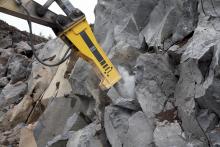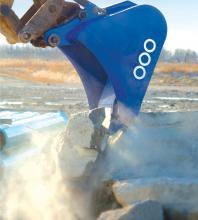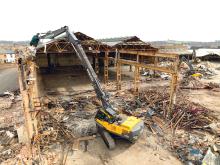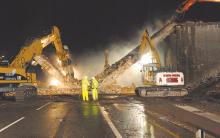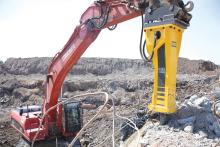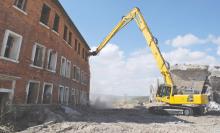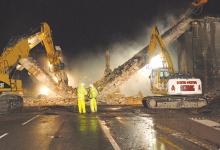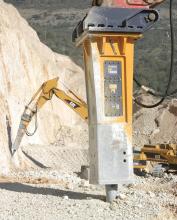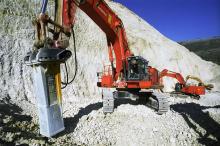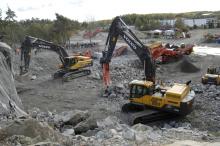An overcrowded Indian flyover was removed in record time using specialist demolition equipment, as Patrick Smith reports Demolition of the landmark Lalbaug flyover south of central Mumbai has been completed and work on a new bigger bridge has started in India's largest city. Although the 38-year-old Sant Dnyaneshwar (Lalbaug flyover) two-lane, one-way traffic artery was serviceable and used by to 15,000 vehicles/hour, there were daily traffic jams and environmental consequences. Despite the complex and dema
TABE hydraulic breakers on show in Budapest, Hungry
An overcrowded Indian flyover was removed in record time using specialist demolition equipment, as Patrick Smith reports
Demolition of the landmark Lalbaug flyover south of central Mumbai has been completed and work on a new bigger bridge has started in India's largest city. Although the 38-year-old Sant Dnyaneshwar (Lalbaug flyover) two-lane, one-way traffic artery was serviceable and used by to 15,000 vehicles/hour, there were daily traffic jams and environmental consequences.Despite the complex and demanding conditions, demolition of the overstrained route happened quickly with two
During demolition of the old flyover, noise and dust impact had to be avoided because of the densely populated residential and commercial complexes around it. The state government allowed only 25 days for the works including levelling and asphalting, leaving just ten days for the basic demolition itself.
Simplex Infrastructure, which was awarded the entire contract, sub-contracted the demanding demolition job to Matte & Associates.
Matte says it was convinced about the capabilities of the silent demolition tools from Atlas Copco, and the company owner even accepted a penalty in case of delay. Basically relying on a combination of two CombiCutters (a CC 1700 U which Matte already owned and a new CC 2500 U specially ordered for the job), demolition started with live TV coverage.
While railings and parapets were crushed by the CC 1700 U above the flyover, the main girders were crushed by the CC 2500 U positioned beside it.
At the end of the first day, almost a quarter of the entire debris volume (5,000m³) had been completed, and after only six days the entire job was completed with the company picking up a bonus for finishing early.
While authorities hope that work on the new bridge will continue at the same pace, devotees of the local Ganesh patron have solved one problem. In previous years they had to cart their idol (the elephant-headed Hindu god Lord Ganesh, Remover of Obstacles) around the old flyover during the annual Ganeshotsav festival procession because it was too tall to pass under the flyover.
Meanwhile, Italian company
The Multi 1000 increases the range of "non-impact" products and is designed to meet the needs of the American market, where large-size equipment is more popular. It is said to be the ideal tool for large-scale demolition work and can be mounted on carriers from 36-60tonnes.
Indeco's HP 18000 has prompted the interest of quarry users having to deal with complex applications (for example hardness of the materials, volume of work) or who plan to make a significant reduction in their use of explosives.
The Marocca Group's activities include building, road construction, public works and the production of high quality limestone aggregates (it operates one of the most important limestone quarries in Anagni, central Italy). It was one of the first to buy the HP 18000 in Italy, attaching it to a 120tonne
At Anagni the excavator coupled with the HP 18000 breaker does the work of two mid-sized machines and manages to reduce the size of the hardest blocks of materials, enabling a faster cleaning of the seam. The HP 18000 also allows a reduction in the need for pre-mining operations, resulting in substantial savings in time and production costs.
The quarry's fully automated crushing and screening plant is able to process over 500m³/hour, a volume matched with a mining
capacity of the same degree, "made possible thanks to the use of Indeco breakers."
Sandvik says it is a design concept incorporating retrofit options that provide users with exceptional flexibility to match the breaker precisely to their application and material requirements.
Key retrofit options include a safety valve that protects the breaker from poor or inappropriate hydraulic installation; Ramlube III (an integrated lubrication device mounted inside the breaker to provide optimum tool bush lubrication), and HD Set, a heavy duty housing option with stone claw for demanding applications.
"The BR2155, being offered in sound suppressed configuration, also benefits from a lightweight design that affords the unit a leading power-to-weight ratio and high productivity levels in a wide variety of demolition, recycling and other industry wide applications," says Sandvik.
A service kit for operation of the breaker and a range of tools for different applications, from demolition to boulder breaking, is also available. Maximum tool diameter is 118mm.
Also from the Breakers Lahti division of Sandvik Mining and Construction in Finland is the 1,700kg BR2577, suitable for carriers in the 23-28tonne range.
With an impact rate of 450-750bpm, the BR2577 also features Sandvik's Fixed Blow Energy system that ensures optimum impact energy with every blow, regardless of hydraulic flow fluctuations.
Retrofit options include the safety valve along with Idle Blow Protector (protects against blank firing); Soft Blow Sensor (reduces the impact power and frequency in softer conditions); Ramlube; Ramdata (operating data collection system); Ramona (performance and operation monitor with operator alert system) and the Ramair dust suppression system.
"A tool diameter of 135mm diameter ensures optimum wear and excellent impact performance and durability," says Sandvik.
In Namibia,
Among bucket crusher manufacturer MB's latest product is the new model BF 90.3, the result of "ongoing investments in technological research and the continuous attention to its customers' needs."
The Italian company showed the new version of the BF90.3 at
Weighing 3,500kg, it has a load carrying capacity of 0.75m³; a mouth opening of 900 x 450mm and a jaw opening from 20-120mm. The BF 90.3 is 2.45m long, 1.35m wide and 1.45m high.
"The new version of the bucket crusher is more resistant in work, featuring a more compact size and improved structural layout to facilitate operator manoeuvres on the excavator," says MB.
Spanish company
It says it "remains faithful to its strategy of promoting its foreign markets where its sales force grows year after year." Almost half of its sales come from exports.
Hungary has experienced a huge construction boost and is still undertaking infrastructure, public works and even residential projects in spite of the current economic climate.
Fran Probanza, the company's sales manager, says: "The TABE strategy in Hungary, and generally in central Europe, has consisted of an ongoing brand presence and promoting a product that can contribute fundamentally and decisively to all of the upgrade projects relating to infrastructures that have been built and are being built in Hungary.
"Through Verbis [its distributor based in Budapest], TABE has a benchmark in central Europe, a large sales team and a leading after-sales service in Hungary."
Among successful models distributed by Verbis are those in the lightweight range, mainly due to the type of works carried out in the country where sales of backhoe loaders are predominant. These include the AGB-175, AGB-375 and the AGB-475 which weigh 170kg, 340kg and 410kg respectively. Mini-digger users have also responded well to the AGB-95, a breaker hammer with 105kg curb weight, with several units being successfully installed.
Hungary is a net receiver of EU Cohesion Funds to build infrastructure, and this, together with the generalisation of the demolition business, boosts sales of TABE's heavy range, such as the AGB-12, a hammer for 20tonne machines.
In Cyprus, TABE's distributor, Pambos Charalambous, specialises in hydraulic hammers and in after-sales support for hydraulic equipment.
"The most popular digger on the island is the backhoe loader, and so the most commonly installed model has been the AGB-475. However, like in Hungary, the introduction of the AGB-95 has been successful."
The AGB-475 can be coupled to machines between 6-10tonnes, and recently the hydraulic hammer has been bought by two customers for road construction work.
The HB880 has an operating weight of 232kg and provides a blow rate from 755-1,150bpm for work on soft ground (860-1,310bpm on hard ground), while with an operating weight of 268kg the HB980 breaker has blow rates of 855-1,060 and 1,170-1,450bpm respectively.
The blow rates in the 1180 model, with an operating weight of 386kg, are 680-1,070bpm (soft ground) and 820-1,280bpm (hard ground). The 65kg HB280 breaker has a blow rate of 600-1,450bpm.
Designed for trenching, concrete demolition and general excavation work, the Bobcat breakers feature a frame with a cylindrical design, providing improved access to jobs in confined areas such as inside structures or holes.

